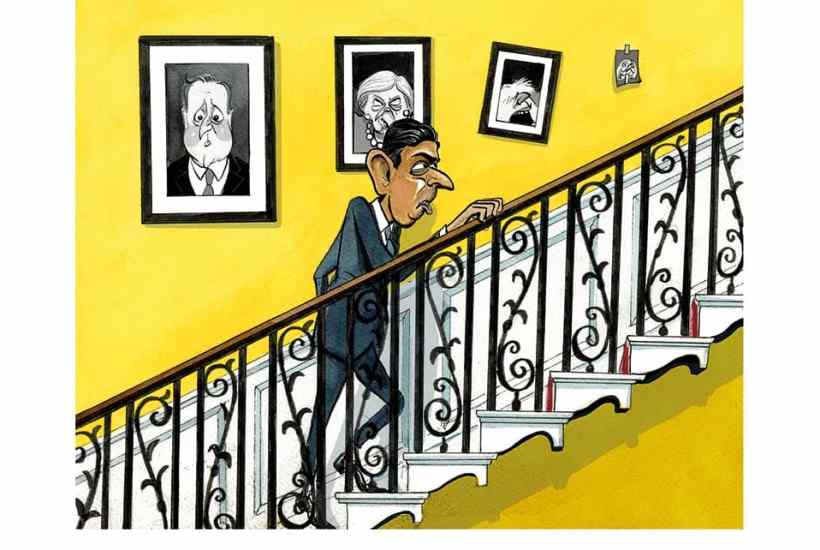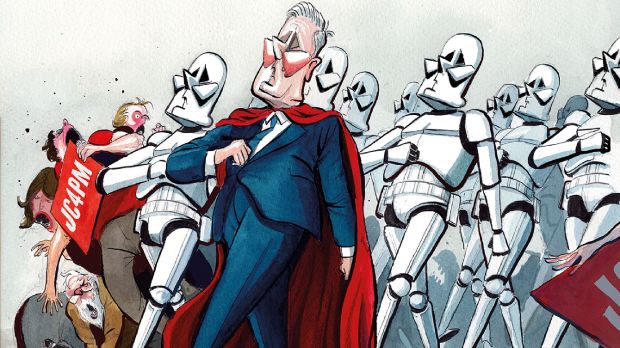It is the most remarkable turnaround in recent political history. On 5 September, Rishi Sunak lost the Tory leadership race to Liz Truss with 43 per cent of the vote. He was written off as another politician with a brilliant future behind him. Seven weeks later, the former Chancellor – whom, I should say, I have been friends with for many years – walked through the door of No. 10.
His political resurrection was made possible by the economy. He spent the summer warning of the risk of slashing taxes without having a grip on inflation and controlling spending. When Truss followed through on her tax-cutting campaign pledges – adding a few more surprise tax cuts and an energy subsidy for good measure – the markets were spooked. This chaos, combined with rebellion from her own MPs, led to a series of U-turns which destroyed her agenda and her authority. Her decision to sack her chancellor, Kwasi Kwarteng, only bought her a few more days in No. 10.
Sunak must now attempt to deal with the fallout from these events. Even without the market reaction to the mini-Budget, this winter was always going to be extremely difficult for the government and whoever was leading it. The need to reassure the markets makes the task harder still.
Sunak’s defeat in the summer’s Tory leadership contest was the first serious setback in his political career. He became chancellor aged 40, just five years after being elected. Many of his critics, who portray him as a careerist more interested in money than politics, predicted he would walk away, perhaps moving to California. But this analysis represented a fundamental misunderstanding of him. Sunak’s politeness – and the easy life available to someone of his means – is too often confused with a lack of toughness. He returned to business as a backbench MP, speaking in a Commons debate the day after Truss became prime minister. He had hoped to make it into the village cricket team in his Yorkshire constituency with the extra time he had on his hands. But this plan has been derailed by events.
The government’s first major act will be an autumn statement that will test whether Sunak, a former Goldman Sachs financier, and Jeremy Hunt, the Chancellor, can assure the markets that there is a credible plan to control debt. This will require both tax rises and spending cuts, and it will be an unpleasant task that will bring bad headlines. Any low-hanging fruit, such as changing the inflation index by which benefits are uprated, has already been picked. If Truss had stayed in office, Hunt would likely have imposed spending cuts and tax rises worth 1.4 per cent of GDP, one of the toughest Budgets in a generation. It would have to be a note of apology to the markets.
But Sunak has no such apology to make: his very appointment to his new role and the fact that Hunt is staying put seems to have soothed the markets, which had been expecting the Bank of England base rate to hit 6.5 per cent to contain the fallout from Trussonomics; a peak of 5 per cent is now expected. The markets had been demanding an interest rate of 4.6 per cent on ten-year government debt; this is now at 3.6 per cent. UK government borrowing is such that the difference of a percentage point can translate into billions from the public purse.
Over the summer, Sunak was pilloried as someone who had been captured by the ‘Treasury orthodoxy’. Ironically, his government now has more flexibility than one led by anyone else would have. Some Tory MPs had also worried that Truss, chastened by the reaction to her mini-Budget, would over-react to what she thought markets wanted, thereby needlessly deepening a recession. Sunak and Hunt are likely to be given more leeway.
Sunak faces two major challenges, the first being government spending. He has always regarded himself as a low-tax Tory, but one who believes spending needs to be controlled first. That can’t be done quickly. With no money to splurge, the Tories will have to return to public service reform – an agenda that has been neglected for the past six years. When David Cameron took office, education and welfare reform plans were ready to go, having been planned for years in opposition. Cameron had five years to implement his plans. This time, the Tories must design a reform agenda while in government, with about two years left until the next general election.
The second challenge is the question of how to grow the economy. Truss and Kwarteng were quite right to argue that growth is an imperative. Their problem was – as Truss’s former economic adviser Julian Jessop admits on p14 – that a long-term tax plan was never properly thought through. Sunak and Hunt will need one.
Sunak is also acutely aware of the problems in welfare. Unemployment may be at historically low levels, but there are huge numbers of economically inactive people (of whom about five million are on out-of-work benefits). Chloe Smith, Truss’s welfare secretary, who returned to the backbenches this week, had come to believe that the NHS waiting list (which now stands at seven million) was slowing the economy as so many need treatment before they can work. She was wondering whether moving those off work because of mental or physical health problems to the front of the queue might solve the problem. Smith might be gone from government, but her successor should keep going with this line of thinking.
Sunak’s problems are also political. Normally, a new prime minister has a honeymoon period with the electorate, but the public are sick of the Tory psychodrama. The Conservative party’s net favourability rating is minus 47. So Sunak will have to deal with a public that is fed up and sympathetic to Keir Starmer’s demands for a general election (which, on current polling, would lead to a Labour landslide).
Sunak’s job will be to assuage by delivering a period of calm, stable government. This can only work if there is party unity, with all Tory factions agreeing on the need for a truce. In the cabinet every Tory tribe is now represented somehow at the top table. Of the three great offices of state, two are held by people who backed Truss in the summer contest. Andrew Mitchell, who organised a rebellion against Sunak over foreign aid cuts, is now back in government. Ben Wallace and James Cleverly, who both supported Truss in the summer and leaned towards Boris Johnson this time, remain in place as Defence Secretary and Foreign Secretary respectively.
If today’s polls were tomorrow’s election results, about two-thirds of Conservative MPs would lose their seats. All of them stand to lose if feuding continues, so they have a joint incentive to behave. But the danger is that there might now be too much poison in the Tory bloodstream. The next few weeks will show whether the party can pull together.
Perhaps the biggest risk for the Tories remains the state of the NHS, where the winter crisis has started early. Record numbers are being kept waiting more than 12 hours in A&E. The waiting list is expected to keep rising all next year – perhaps hitting nine million, more than double pre-lockdown levels. The danger for the Tories is that a hard winter could put the health service in real trouble and allow Labour to deploy its simplest slogan: you can’t trust the Tories with the NHS.
It is telling that Sunak has sent Steve Barclay back to the Health Department. Barclay was in charge of all the contingency planning for this winter and so knows what needs to be done to stand the best chance of getting through the next few months. But the fundamental problem for the NHS is a lack of capacity in terms of both beds and doctors. That problem can be alleviated – pension rules can be relaxed to lure more doctors back to work, technology can be used to monitor more patients at home – but it cannot be solved in time for this winter.
In the middle of all this trouble at home, a brutal war continues in Europe. Sunak’s decision to make Volodymyr Zelensky his first foreign leader call and to keep on the Foreign and Defence Secretaries as well as the No. 10 foreign policy adviser showed his commitment to continuity. But the situation may soon escalate. The Russians are making ever more preposterous claims, including that the Ukrainians might use a dirty bomb designed to look like a Russian tactical nuclear weapon strike. Alarmingly, the Russians have a habit of accusing others of what they plan to do themselves.
Truss’s experience in No. 10 showed how nothing can really prepare you for the demands of the very top job. She had been a cabinet minister for eight years and was foreign secretary, yet still her premiership fell apart in six weeks. Sunak was Chancellor during Covid, which is probably as close as you can get to the pressures of being PM without actually doing the job. He is also helped by having Oliver Dowden, who has extensive No. 10 experience, as a close political ally. As Chancellor of the Duchy of Lancaster, Dowden is now in charge of making the government machine work.
During the Covid crisis, we saw that Sunak believes that the government should be frank about the trade-offs involved in any decision. His interview in this magazine in August was, most of all, a criticism of the failure to be clear about the trade-offs that lockdown would involve. It was striking that in his first speech outside No. 10 he immediately warned of ‘difficult decisions’ to come and the ‘profound economic crisis’ facing the country. We can expect him to be less boosterish in some of his claims than his predecessors.
Sunak has become leader of a party that has seldom ranked lower in the polls, whose defeat at the next election is now assumed even by many of its own MPs. Just before he turned to walk through the door of Downing Street for the first time as PM, Sunak spoke of hope for the future. The challenge is to get through this winter without that sense of hope being extinguished.
Got something to add? Join the discussion and comment below.
Get 10 issues for just $10
Subscribe to The Spectator Australia today for the next 10 magazine issues, plus full online access, for just $10.
You might disagree with half of it, but you’ll enjoy reading all of it. Try your first month for free, then just $2 a week for the remainder of your first year.














Comments
Don't miss out
Join the conversation with other Spectator Australia readers. Subscribe to leave a comment.
SUBSCRIBEAlready a subscriber? Log in